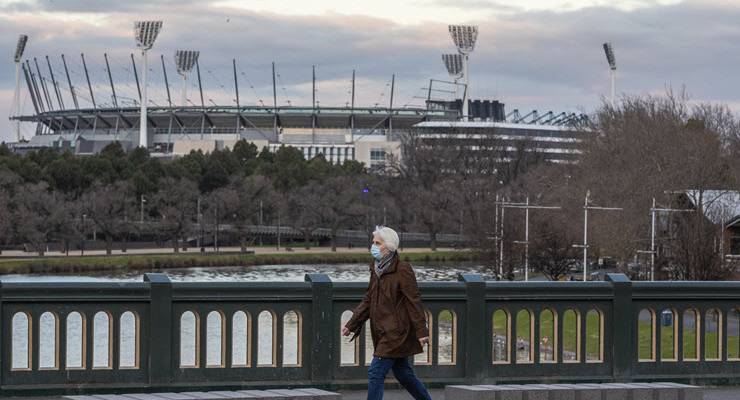
In Both Sides Now, author and ethicist Leslie Cannold presents two sides of an argument and then it’s over to you: what do you think is true, and what do you think Cannold really believes?
Today: the new, fast moving and ever-changing nature of COVID-19 makes the public more reliant than ever on the media’s provision of timely information. But what do journalists owe the public? To be helpful, or to tell it like it is?
Yes: If reporting doesn’t support medical policy laid out by the government, it’s better to mute any criticism (unless that policy is culpably wrong). No: It’s vital that reporters and commentators provide informed commentary, critical or not, on pandemic policy — the audience deserves nothing less.
Last week, I complained on Twitter about the number of tradies in my 5km lockdown zone who weren’t social distancing or wearing masks. A response from an academic took me aback. She wrote: “You really think this sort of thing is helpful?”
In a word, yes. This was day four of Melbourne’s fifth lockdown, with no clear end in sight. Recent transmission events at outdoor events at the MCG and AAMI Park underscored what NSW officials had already said was true: that the more transmissible and virulent Delta variant was capable of infecting people outdoors, including on the building worksites that were one source of Sydney’s rising rate of infections.
Given the importance of proactivity during the COVID-19 pandemic, it seemed important that the widespread compliance achieved by this workface during last year’s Melbourne lockdown be repeated if we didn’t want to lose control of the virus the way Sydney had.
But her comments made me think about what the role of someone like me, a media commentator, actually is during a deadly and economically devastating global pandemic.
Is my job to be helpful? Or to get the facts right and ensure my opinions are informed by them, and let the chips fall where they may?
Yes
The Council of Europe takes the view that rights of the free press are more important than ever during a global health crisis, but so are its responsibilities. In particular, the media has a right to receive timely and pertinent information about the crisis from governments via press briefings, reports and public pronouncement — and to not be censored.
In turn, media organisations and journalists are obliged to inform and educate the public about the pandemic through coverage “based on independent news sources, transparent editorial methods and accurate, fact-checked information”. Press coverage must also “scrutinise the measures taken to curtail the crisis, prompting re-evaluation and regular adjustment as needs evolve”.
The press should “give priority to authoritative messages regarding the crisis” and “refrain from publishing, and thus amplifying, unverified stories” and “implausible/sensationalist materials that could cause panic” or undermine “people’s understanding [of] and cooperation with necessary restriction”.
Did my tweet contradict this guidance? I can’t see how. There was nothing in it that was false or inaccurate, and it seems to fit snugly within the media’s duty to “scrutinise the measures taken to curtail the crisis, prompting re-evaluation and regular adjustment as needs evolve”.
Having said that, the implication of the Council of Europe’s standards is that in a crisis, members of the media must go the extra mile. Misinformation, disinformation, sensationalism and plain false reporting are the bane of thriving democracies everywhere. But during a global pandemic, they can be deadly.
That means that in exchange for my access to information and an audience, I must take extra care when talking about the pandemic and the public health measures we use to defeat it. If the facts don’t lead me to support government policy in the middle of the crisis, unless I believe that policy is palpably and culpably wrong, I should mute my criticism — or say nothing at all.
No
Media commentators are not mouthpieces for government or the big end of town, no matter how desperately they wish we were. The role of the fourth estate in a democracy is to check power, not to be its cheer squad, no matter how worthy the cause.
When we forget this, our audience can feel gaslit and become wary of our reporting because they’re no longer sure whose side we’re on: the powerful, or theirs. This was the problem Professor Jay Rosen identified with Australia’s journalistic culture the last time he was in the country, and it persists today.
Governments don’t always get it right. In their response to a pandemic and everything else. This is why the Council of Europe says it’s important for the press to scrutinise pandemic policies and offer criticism.
This suggests that not only are media commentators entitled to provide an informed critique of pandemic policy, it’s critical that they do, because without such scrutiny, changes to policies that might not be working won’t happen.
Are the powers that be likely to find such scrutiny “helpful”? Almost certainly not, but that doesn’t mean it isn’t, or that media commentators aren’t playing a crucial role in the pandemic response by offering it.
The upshot? “Unhelpful” commentary may in fact be very helpful, even if it’s unwanted. More critically, providing such analysis — as long as it’s grounded in an informed analysis of verifable facts — is a media commentator’s role. Because because that’s what our leaders need and our audience — adults more than capable of making up their own minds — have a right to expect.








Forget the semantics and hair splitting. This is serious. Tell it like it is. Be guided by what the experts say. They dont have any other agenda but to do their job properly. Politicians on the other hand have many hidden agenda and you can only be sure that whatever they do is mainly for their own benefit. The public good is rarely top of a politicians agenda. So call them out for every deviation from the expert line. And dont hold back.
The dreaded binary masquerading as an overview….. offer the public two choices or factors, but even better, just one in an effort to keep all on piste…